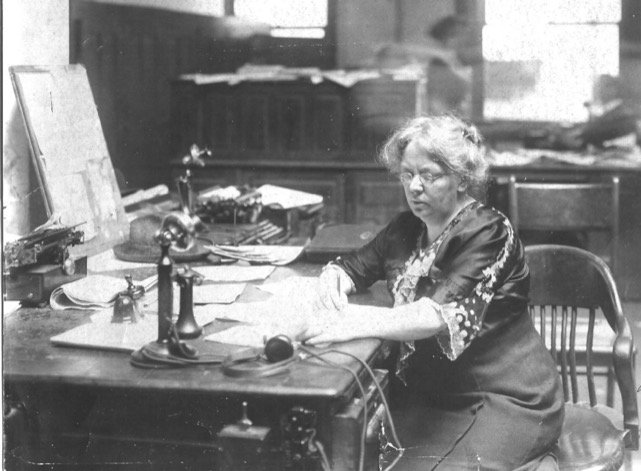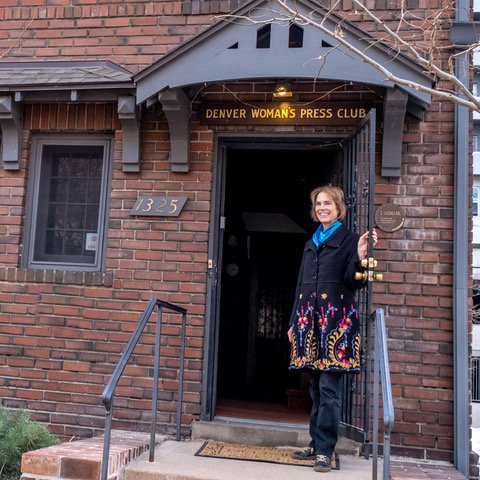Denver Women’s Press Club digs for buried writing talent
Special to Colorado Community Media - This story was originally published in Washington Park Profile/Life on Capitol Hill, a publication of Colorado Community Media.
Rocky Mountain News journalist Minnie J. Reynolds worked to help Colorado women gain full voting rights in 1893. Over the next five years, she played a major role in organizing the Denver Woman’s Press Club and became its first president. COURTESY OF WOMAN’S PRESS CLUB
Winning the Unknown Writers’ Contest sent aerospace engineer Petra Perkins’ career on a new trajectory.
“It opened up a new world of possibilities,” said Perkins, who lives in Highlands Ranch and is now a professional writer specializing in memoir.
The competition, which is sponsored by the Denver Woman’s Press Club (DWPC), also helped Denver author Corinne Joy Brown launch her career as a novelist.
“I felt as if I had been recognized by women I respected and idolized,” she said. “Looking back, it was a life-changing experience.”
After a pandemic hiatus, the DWPC is again soliciting entries with a deadline of Feb. 23. All residents of Colorado, aged 18 and older, may enter as long as they have never been professionally published.
Founded in 1898, the DWPC is one of the nation’s oldest clubs for female journalists. While the Unknown Writers’ Contest doesn’t go back quite that far, the competition has been pulling unknown writers out of obscurity for decades.
“It is one of my favorite sources of surprise,” said Katherine “Kim” Millett, who serves as the contest’s chairwoman and is a nationally-published journalist and retired editor with The Denver Post. “It reaches out into the unknown, all over Colorado.”
Said DWPC President, Mindy Sink, a freelance non-fiction writer, “we’re really interested in people’s stories whether they’re pandemic-related or not. It’s a wonderful time for our group to be sharing with the world again.”
Winners celebrate over a proper English tea
Entrants can write their way to first, second and third prizes in three categories: Short Fiction, Non-Fiction and Poetry. The contest winners will be invited to read their work aloud at an April 10 awards ceremony held at DWPC’s historic clubhouse, 1325 Logan St., in Capitol Hill.
Contest winners often bring their families to the ceremony, something both Millett and Sink find especially touching.
“It’s wonderful to see adult children cheering for their parents,” Millett said.
After the readings, members and honorees adjourn for a proper English tea. According to Millett, this tradition began years ago with an English club member who provided an authentic tea service with delicate porcelain tea cups and homemade scones.
The tea is served under the approving gaze of Mary Elitch Long, whose formal portrait graces the club’s main meeting room. A turn-of-the century entrepreneur and society hostess, Long was also an enthusiastic booster of DWPC. Before the club acquired its permanent quarters in 1912, she hosted many gatherings at her picturesque cottage on the grounds of Elitch Gardens, the amusement park and zoo she co-founded with her husband, John Elitch. Elitch Gardens originally occupied 16 acres of farmland in north-western Denver.
Coaching instead of criticizing
Who enters the Unknown Writers’ Contest?According to Millett, entries arrive from towns large and small, throughout Colorado. Some contestants write while struggling with poverty or homelessness, including people served by Denver’s nonprofit daytime drop-in center, The Gathering Place, where DWPC members have led writing workshops. The center, located at 1535 High St. in the City Park West neighborhood, provides supportive services to women, children and people who are transgender. Millett noted with pride that some writers from The Gathering Place have gone on to win awards, join DWPC and become published authors.
Whether they win awards or not, all entries receive constructive written feed- back from two professional writers who are members of DWPC.
Katherine “Kim” Millett, chairwoman of the Unknown Writers’ Contest sponsored by the Denver Woman’s Press Club, wants to open the door to new writers. PHOTO BY TIM COLLINS
This was especially important to former contest winner Corinne Joy Brown.
“There are very few places where you get peer-reviewed recognition,” she said.
According to Millett, DWPC judges undergo special training to ensure that contestants get supportive coaching — rather than criticism.
“As judges, we are not teachers or editors, we are there as sensitive readers,” she said. “Our mission is to encourage.”
Club dates back to Woman’s Suffrage era
Not to be confused with the Denver Press Club, originally intended for men, the Denver Woman’s Press Club was founded as a haven for female journalists in a repressive era of bustles and poke bonnets.
“It was these women’s equivalent of going out for a beer,” said Millett. “They used the club as a way to let loose and havefun with their writing.”
The club was born amidst the woman’s suffrage movement, when leading female journalists such as Minnie J. Reynolds, the society columnist for the Rocky Mountain News, urged male editors throughout Colorado to write editorials in favor of granting women the right to vote. Those efforts paid off when 70% of state newspapers complied. Her efforts helped women gain full voting rights in1893, making Colorado the first state to enfranchise women through popular referendum.
A striking poster in the club’s foyer depicts Reynolds elegantly attired and seated at her typewriter. She went on to become a national advocate for women’s suffrage and DWPC’s first president. Many prominent women joined, including Helen Ring Robinson, Colorado’s first woman state senator and Mary Coyle Chase, who won the Pulitzer Prize for her 1944 Broadway play, “Harvey.”
Today, the club occupies a landmarked building that was once the former home and studio of professional artist George Elbert Burr. Burr was known for his etchings of Colorado and they are on display in the main room, near the portrait of benefactor Mary Elitch Long. Bookshelves are lined with volumes written by club members.
Every time the Denver Woman’s Press Club meets, it is surrounded by the history it helped to make.

